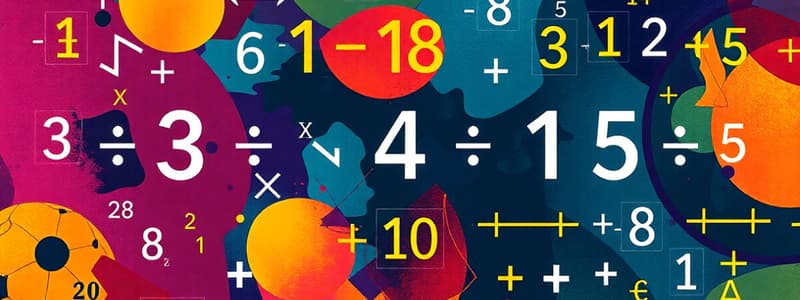Podcast
Questions and Answers
What type of numbers can be expressed as a fraction p/q, where p and q are integers and q ≠ 0?
What type of numbers can be expressed as a fraction p/q, where p and q are integers and q ≠ 0?
- Rational numbers (correct)
- Natural numbers
- Whole numbers
- Irrational numbers
Which mathematical branch is primarily concerned with the concepts of limits, derivatives, and integrals?
Which mathematical branch is primarily concerned with the concepts of limits, derivatives, and integrals?
- Algebra
- Statistics
- Calculus (correct)
- Geometry
What is the primary focus of geometry?
What is the primary focus of geometry?
- Studying numbers and their relationships
- Shapes, sizes, and positions of figures in space (correct)
- Analyzing functions and their changes
- Manipulating symbols
Which of the following represents the rate of change of a function with respect to a variable?
Which of the following represents the rate of change of a function with respect to a variable?
What is a key feature of complex numbers?
What is a key feature of complex numbers?
What does discrete mathematics primarily deal with?
What does discrete mathematics primarily deal with?
In algebra, what do variables typically represent?
In algebra, what do variables typically represent?
Which concept in geometry is primarily concerned with the measurement of space in three dimensions?
Which concept in geometry is primarily concerned with the measurement of space in three dimensions?
Flashcards
Arithmetic
Arithmetic
The branch of mathematics that deals with numbers and their properties, including operations like addition, subtraction, multiplication, and division.
Mathematics
Mathematics
The study of abstract concepts and using logic and reasoning to derive conclusions.
Real Numbers
Real Numbers
The set of numbers that includes all natural numbers, whole numbers, integers, rational numbers, irrational numbers, and complex numbers.
Rational Numbers
Rational Numbers
Signup and view all the flashcards
Irrational Numbers
Irrational Numbers
Signup and view all the flashcards
Algebra
Algebra
Signup and view all the flashcards
Geometry
Geometry
Signup and view all the flashcards
Calculus
Calculus
Signup and view all the flashcards
Study Notes
Fundamental Concepts
- Mathematics is the science of quantity, structure, space, and change.
- It involves studying abstract concepts and using logic and reasoning to derive conclusions.
- Fundamental concepts include numbers, algebra, geometry, and calculus.
- Arithmetic is the basic component of mathematics, involving operations like addition, subtraction, multiplication, and division.
Number Systems
- Natural numbers (counting numbers): 1, 2, 3,...
- Whole numbers: 0, 1, 2, 3,...
- Integers: ..., -3, -2, -1, 0, 1, 2, 3,...
- Rational numbers: numbers expressed as a fraction p/q, where p and q are integers and q ≠ 0.
- Irrational numbers: numbers not expressible as a fraction of two integers.
- Real numbers: the set encompassing all rational and irrational numbers.
- Complex numbers: numbers in the form a + bi, where a and b are real numbers and i is the imaginary unit (√−1).
Algebra
- Deals with symbols and rules for manipulating them.
- Variables represent unknown quantities.
- Equations represent relationships between variables.
- Solving equations involves finding variable values that satisfy the equation.
- Includes topics like linear equations, quadratic equations, systems of equations, and inequalities.
Geometry
- Focuses on shapes, sizes, and positions of figures in space.
- Includes concepts like points, lines, angles, triangles, circles, polygons, and three-dimensional shapes.
- Deals with measurements like area, volume, and perimeter.
- Uses theorems and postulates to establish relationships between geometric figures.
- Different branches include Euclidean geometry, non-Euclidean geometry, and analytic geometry.
Calculus
- A branch of mathematics dealing with change.
- Includes concepts like limits, derivatives, and integrals.
- Derivatives represent the rate of change of a function concerning a variable.
- Integrals represent the accumulated effect of a function over an interval.
- Applications include optimization problems, motion analysis, and trend/pattern analysis in data.
Other Branches
- Discrete mathematics: deals with countable objects and relationships, like combinatorics and graph theory.
- Statistics and probability: deals with collecting, analyzing, interpreting data, and calculating the likelihood of events.
- Linear algebra: deals with vector spaces, linear transformations, matrices, and systems of linear equations.
- Number theory: focuses on number properties, like prime numbers, divisibility, and patterns.
- Topology: studies shapes and how they deform, focusing on preserved features under continuous transformations.
- Abstract algebra: deals with abstract structures like groups, rings, and fields.
Applications
- Utilized in various fields like physics, engineering, computer science, economics, and finance.
- Enables problem-solving and modeling complex phenomena.
- Helps in making predictions and forecasts.
- Facilitates analysis of information and patterns in large datasets.
- Crucial in developing technologies and innovations.
Studying That Suits You
Use AI to generate personalized quizzes and flashcards to suit your learning preferences.




